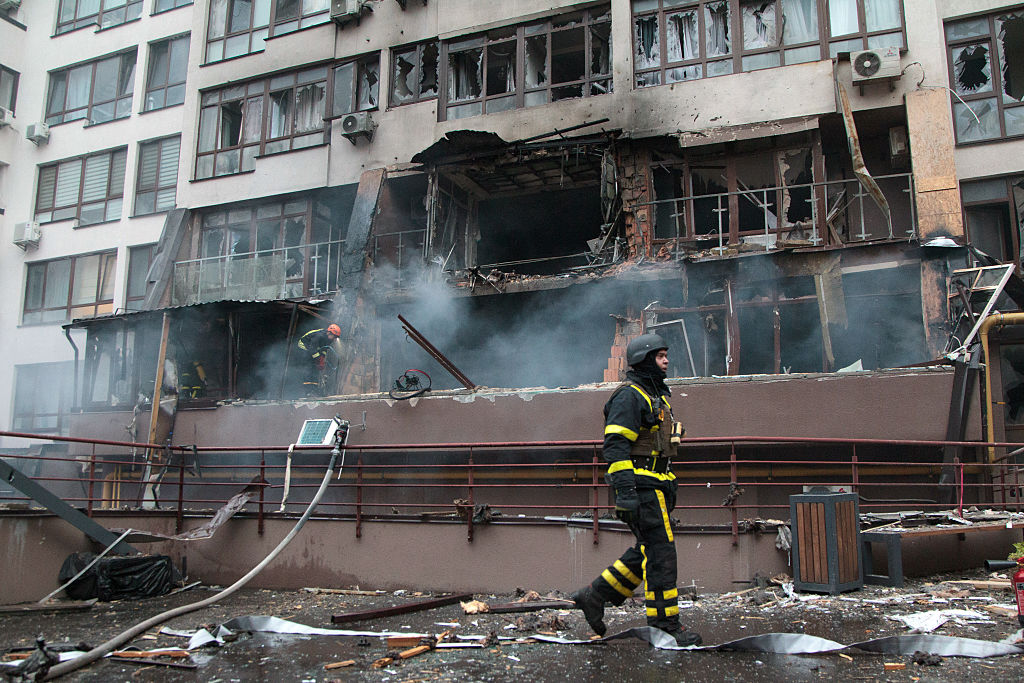For Ukraine, For Their Freedom and Ours!, a French nonprofit, has filed a case with the International Criminal Court (ICC), accusing Russia of the “systematic, widespread, and organized” looting of Ukrainian cultural heritage.
The organization, which describes itself as “committed to supporting the Ukrainian cause in the face of Russia’s war of aggression,” submitted the complaint on July 11. It calls for arrest warrants to be issued for Russian president Vladimir Putin and eight high-ranking Russian officials, claiming that mass plundering since the start of the 2022 invasion was “planned at the highest level of the Russian state.”
“After a lengthy investigation, we were able to determine the modus operandi of this predation … and identify the main perpetrators of acts aimed at appropriating Ukrainian cultural heritage,” the group said in a statement. “These acts can be classified as war crimes under international law. Led by Vladimir Putin, the implementation of this policy of systematic plunder involves senior officials from the Russian Ministry of Culture, directors of major museums, and even Sergei Naryshkin, the head of Russian foreign intelligence.”
Related Articles

In June, UNESCO verified damage to 501 cultural sites in Ukraine caused by Russian forces since February 2022. These include 151 religious sites, 262 buildings of historical and/or artistic interest, 34 museums, 33 monuments, 18 libraries, one archive, and two archaeological sites.
For Ukraine, For Their Freedom and Ours! said that Russia’s invasion has “resulted in the largest plundering of cultural heritage in Europe during international armed conflict since the Second World War.”
“Our lawyers are confident in how the prosecutor’s office will handle the information” submitted to the ICC, Christian Castagna, the nonprofit’s advocacy manager, told ARTnews.
In 2023, the ICC issued two arrest warrants for Putin over the illegal wartime deportation of Ukrainian children to Russia, following a campaign by For Ukraine, For Their Freedom and Ours!. Ukraine’s human rights commissioner said the warrants helped to return nearly 400 of the 19,546 children reported as abducted.
“In my opinion, after the two arrest warrants were issued by the ICC for Putin, it has become easier to return children,” Dmytro Lubinets, the commissioner, told reporters at the time. However, he added that deportations were still ongoing.
Russia, meanwhile, has argued that it is relocating Ukrainian children to protect them from being abandoned in a conflict zone.
“The content of the communication we submitted to the ICC on July 11 is very precise and well-argued regarding how Moscow prepared the looting of museums and the erasure of Ukrainian cultural identity,” Castagna said Monday. “Our work, in its spirit and conduct, is very similar to that which we conducted regarding the forced abductions of Ukrainian children.”
Earlier this year, in May, Castagna and a group of arts professionals called on the International Council of Museums (ICOM)—a nongovernmental organization that sets industry standards—to eject Russia for violating its code of ethics.
In an open letter published in Le Monde, the group said it would take ICOM to court in France, where the NGO is headquartered, if it failed to remove Russia.
“Because ICOM is an NGO subject to French legislation,” Castagna told ARTnews at the time, “if it does not follow what is written in its statutes, its members can demand that ICOM’s executive board respects its statutes and dismisses Russia for violating its code of ethics.”
On Monday, he added, “Since the publication of the [the open letter in Le Monde], we have seen the reluctance of many professionals to stand up to Russians who do not respect ICOM’s operating rules. They do not want to mix political struggle with cultural activities. But the erasure of Ukrainian cultural identity is indeed a neo-colonialist political project.”
“It is now a matter of fueling the debate in such a way that art professionals take stock of the crimes committed by Russia,” Castagna said.

